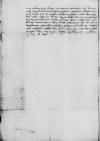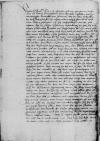Aus Ewer Herlichkeit schreiben hab wir vornhomen, (: dartzu auch die edlenn, erenvhestenn hern ⌊dantzker castellan⌋ / und ⌊marienburgscher underkemerer⌋ stimmen :) das der hern bedencken, die auf dasmhal ⌊koniglicher maiestet⌋, unsers allergnedigsten hern, brief negst zum ⌊Elbing⌋ gefunden, Ewer Herlichkeit hot wolgefallenn / und vor gutt achtenn, / das in solcher mheinung / erstreckung der zeitt / bis auf unsere zukunftige ⌊thagfart⌋ von hochgedachter koniglichen maiestet wurde gebethen / mit vorbehalt, / was sonst eim idern zu diessem handel das beste wurd beduncken, / solchs schriftlich einer dem andern thet mitteilen / und daraus koniglicher maiestet unser antwurt zuschrieben. / Dis alles, / den meisten stimmen zum ⌊Elbing⌋ zufallende, / hab wir Ewer Herlichkeit und andern ⌊hern rethen⌋ wissen lassen. / Wiewol unser bedencken, / das wir dazumhal denselbtigenn ⌊hern zum Elbing⌋ entdeckt, / fast anders gewesen, / hab wir unns dennoch dem meisten theil nicht wolt widren / und dermassen Ewer Herlichkeit solche mheinung schriftlich angezeigt. / Wir wollen aber rathsweis / was wir auf koniglichen brief gemeltenn ⌊hern⌋ haben fur geben / Ewer Herlichkeit nicht vorhaltenn, / als nemlich, / weil ⌊konigliche maiestet⌋ die hern rethe alle, / oder etliche in volkomner macht geschickt, / zu sich furdert, / von wegen das ihre maiestet alters und schwacheit halben / nicht vormag hie bey uns zu sein, / die putzker sache, / die dan notabilis ist, / noch laut unser privilegienn / mit den ⌊hern dieser lande rethen⌋ zu richten und ortern. / Das es sich wol wil zimen, / wolle wir anders unsere privilegia bei krafft unnd wirden behalten, / das wir alle, / oder etliche aus unserm mittel, / noch altem gebrauch / an ⌊konigliche maiestet⌋ vorfertigen, / die mit irer maiestet, / ane beywesenn der ⌊hern der Cron⌋, / diesse sache vorhortenn / und der abzuhelfenn gegenwertig weren. / Wie solchs nachblieben, besorge wir unns, / das ⌊ihre maiestet⌋ es davor wurd achten, / gleich ob wir unsere privilegia vorliessenn / und nachgeben, mit den ⌊hern der Cron⌋ diese sache zu erkennen und rechtsweis darine zuspre[chen]. Was unfueg hieraus ⌊diesen landen⌋ wurd erwachsen, / ist am thag.... (: Das wir aber den vorschub oder erstreckung diesser sachen bis uf unsere negste ⌊thagfart⌋ sollen bitten, / weil ⌊ihre maiestet⌋ ire citacion wi... die ⌊ersamen von Dantzke⌋ het lassen ausgehen, / wurde wir schwerlich erhaltenn / und mit vorlierung der zeit / unser privilegien abbruch leiden. :) Solchs zu diesem handel gereth / bedunc[kt] uns noch, / das es under unns / mit vleis wurde bedacht, / dami[t] wir unns selbst nicht im lichte stunden. / Dis wolde Ewer Herlichkeit mit andern ⌊hern rethen⌋ grundtlicher betrachten, / auf das wir nicht dieser lande privilegien zuschaden anstiessen. / Nichts wenigers, wo hin sich die meisten stymmen ziehen, / wolle wir volgen und were notig / von kurtze wegen der zeitt, / das wir uns samptlich dis handels ane weitter seumen theten entschliessen / und ⌊konigliche maiestet⌋ beantwurten. / Was weitter hierinne Ewer Herlichkeit, / die wir in langweriger gesuntheit gotlichen gnadenn bevelhen, / vor nutzlich wirt ansehenn, / wolde uns und andere hern mit den ersten berichten.

